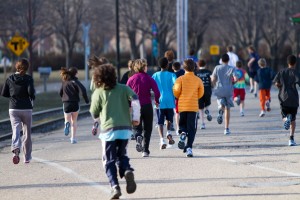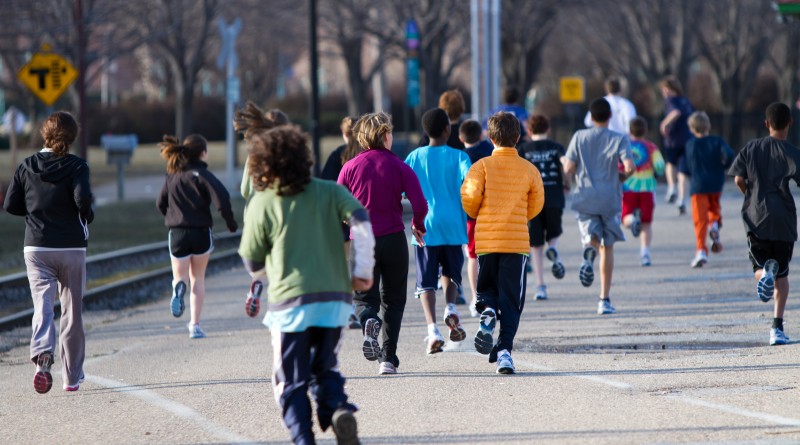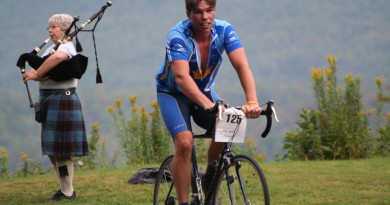40 Youths Get the Running Start of a Lifetime | 18 & Under

On May 29, more than 8,000 runners will weave their way though downtown Burlington as part of the 2011 KeyBank Vermont City Marathon. Some of these participants will traverse the entire 26.2-mile course, while others will only cover a fraction of the total distance. The participants will represent people of all ages, from all walks of life, and from all parts of the country. Merely completing the race will be a satisfactory accomplishment for some, while others will be hell-bent on covering the course as fast as humanly possible, in pursuit of age-group records and first-place finishes.
But for 40 young runners, training for the VCM will be more than just a jog on the bike path: it will be their first encounter with the sport of running as a platform for physical fitness and a healthy lifestyle.
May 29 represents the culmination of 10 weeks worth of hard work for these athletes, and very well could be a stepping-stone to many future races. These 40 runners are members of RunVermont’s Junior Youth Relay program, which gives Burlington-area youth ages 11 to 16 the opportunity to participate on a two- or five-person relay squad and learn what running is all about. Oh yeah, and they get outfitted with free gear from the Skirack too.
The Junior Youth Relay program was designed to give underprivileged kids an opportunity to run the relay portion of the marathon. In conjunction with youth centers in Burlington—including the King Street Center, the Boys & Girls Club and the New North End Youth Center—the program stays true to its initial goal, but it also has pursued a more basic ideal: getting kids outside and moving, regardless of class or socioeconomic status. Scott LaMothe, in his sixth year as the program’s coordinator, says the program has opened its doors to be more inclusive. “The program’s branched out a little bit to include a few teens who wouldn’t be considered ‘underprivileged,’ in order to mix socioeconomic backgrounds,” he says. “The basic concept of the program remains the same. I sometimes don’t know who’s who, with respect to the kids’ backgrounds, and that’s fine by me—the approach is exactly the same: it provides them an opportunity to explore running as an option and exposes them to a healthy lifestyle.”
The program does more than just give kids the opportunity to run. It educates them on various aspects of healthy living, including nutrition, stretching, and injury prevention. According to LaMothe, it’s sometimes difficult to get a group of energetic adolescents to pay attention to these lessons. “We have guest speakers who come and talk to these kids about taking care of your body. It’s a very comprehensive program in that regard. [The kids aren’t] too thrilled about the education aspect. The guest speakers will probably only affect 10 of 15 of them. A lot of them are antsy, and just want to get out and go, but I think it’s important to expose them to it, so we continue with it,” he says.
The program has grown in scope in recent years and has evolved into a kind of development program whereby kids can build off what they accomplished last year and run longer distances. “We get so many kids who want to come back and do it,” LaMothe says. “The kids start out when they’re 10 to 12 years old, and as they get older, we promote the half-marathon relay. We’re in our second year of kids who split it [the marathon]. They’ve grown with the program, and they’re ready for the challenge. We have one kid who’s been doing the program so long, he’s running the whole thing—he’s a mentor too, and he helps out with coaching responsibilities.”
Sevin Gulfield, a 13-year-old from Burlington, is one of the athletes who will be tackling the 13.1-mile challenge this year.
“I knew immediately after running last year, that I wanted to run this year,” he says. “It was my decision to run the half, because I felt it would be more fun to run a lot longer. I like spending more time out there. I’m going to do a six- to 10-mile run leading up to the race. I’m going to adopt a slower pace to be able to run long, and I’m going to train more. I deal with the frustration of slowing down by remembering how long I have to run.”
The popularity of the program might have something to do with the sense of accomplishment it provides and the lessons it imparts. Even though many of the kids in the program are new to running, the universal sense of satisfaction we all get after a good hard run has a profound effect on them. “I just like running the actual leg a lot and how I feel afterward,” says Guthrie Cannon MacMarin, a 12-year-old who goes to Edmunds Middle School in Burlington. “It’s really nice to know you’ve run what you ran, and getting to look at the results and see your team on there. I’m definitely going to continue in the future—my school has a cross-country team that I’ll probably start running on.”
Anders Cole, a first-year participant in the Junior Youth Relay program, views running as a holistic activity that challenges both his physical and mental capabilities. “I play tennis a lot. What I like about running is that it’s sort of getting to know yourself and how you coordinate your mind and your body, and that’s really interesting to me. Tennis is the same way. I like the fact that it’s not just about strength, it’s about endurance,” he says.
To learn more about the Junior Youth Relay program and RunVermont’s other programs, including the upcoming KeyBank Vermont City Marathon, visit www.runvermont.org.
Chris Keller, a senior at Montpelier High School, is writing at Vermont Sports as part of a community-based learning project. He hopes to share with readers the passion that Vermont youth such as him have for the outdoors. If you have any good story ideas, feel free to e-mail Chris at kellerc@mpsvt.org.



